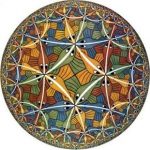I began a post in 2013 by recognizing something that David Deutsch said in a TED talk in 2005. I have referred back to it many times since, and here I will do it again. But this time I would like to present it more completely. It’s a beautiful articulation of something that’s just […]
|
|||||
|
In my last post I tried to argue that Humberto Maturana’s biology of language might have something to say about the biological nature of mathematics. This biology of language that Maturana proposes is understood in the context of autopoiesis (the continuous self-creation of any living system) that is his fundamental definition of life. I […] 
Recently I became particularly sensitive to discussions that address ‘meaning’ as an emergent property of both biological and formal systems (of which mathematics is one). And this is because it is the meaning of symbols in mathematics that is the source of its power. But it is not at all clear that the meaning of […] Familiar mathematical structure is found in the neural activity that governs how the body orients itself and navigates its environment. Grid cells are neurons, found in areas neighboring the hippocampus, whose individual firings line up in a coordinate-like pattern according to an animal’s movement across the full extent of its environment. Their grid pattern acts […] A recent issue of New Scientist featured an article by Kate Douglas with the provocative title Nature’s brain: A radical new view of evolution. The limits of our current understanding of evolution, and the alternative view discussed in the article, are summarized in this excerpt: Any process built purely on random changes has a lot […] My last post focused on the kinds of problems that can develop when abstract objects, created within mathematics, increase in complexity – like the difficulty of wrapping our heads around them, or of managing them without error. I thought it would be interesting to turn back around and take a look at how the seeds […] Today, I involved myself in a debate that hasn’t gotten very loud yet and, perhaps for that reason, I felt like I was going around in circles a bit. The questions I began trying to answer were sparked by a Mind Hacks post entitled Radical embodied cognition: an interview with Andrew Wilson. Wilson’s ideas challenge […] Each year, Edge.org asks contributors to respond to their annual question. In 2014, the question was: What scientific idea is ready for retirement? There were 174 interesting responses, but one that got my attention was written by Scott Sampson (author, Dinosaur Odyssey: Fossil Threads in the Web of Life). The idea that Sampson would like […] I thought recently, again, about the relationship between the written word and mathematical notation, both being systems of marks that carry meaning. Both systems grow with usage, and both provide some steady refinement of what we are able to see. I’m not so much interested, here, in the relationship between mathematical proficiency and language proficiency, […] Recently, I became intrigued with the discussions of topology that I found among architects and historians of architecture. I saw a few familiar threads running through these discussions – like the emergence and self-organizing principles of biology, together with the view that mathematics was not, primarily, a tool but more a point of view. I […] |
|||||
|
Copyright © 2025 Mathematics Rising - All Rights Reserved Powered by WordPress & Atahualpa |
|||||


Recent Comments